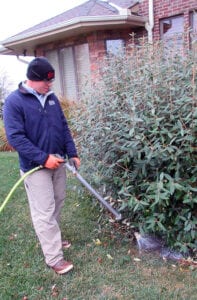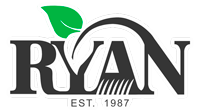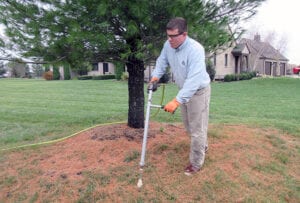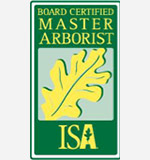Best Tips For Fertilizing Evergreens, Trees & Shrubs in the Fall
Lawn & Tree Experts Answer Your FAQs about Fall Fertilization
You gear up for taking care of your lawn in the early spring but did you know that fall is a great time to take that same caring approach by fertilizing your evergreens, trees and shrubs? At Ryan Lawn & Tree, we understand you can’t plant a new tree or shrub and just expect it to grow and flourish. Fertilizer is the caring touch your trees and shrubs need to maintain their strong and robust condition and to help them fight off any disease or insect attacks. We’ve compiled this list of the most commonly asked questions from our customers about fertilizing your trees and shrubs in the fall.
Q: Why should I fertilize my trees & shrubs in the fall?
A: As in many cases regarding landscape treatment applications, timing is extremely important! While it’s common thinking that all fertilization of evergreens, trees and shrubs should be implemented in the spring, the late fall is also one of the best times to fertilize. At this time, deciduous trees and shrubs are losing or have lost their foliage for the year and active growth of plants and trees has slowed. Rather than putting on new foliage growth, deep root feeding for trees allows them to take the nutrients from the soil and apply them to important health-promoting functions, such as disease resistance and root development. The excess nutrients are stored in the roots and become immediately available when needed for new growth next Spring. Specifically, fertilizing your trees and shrubs in the fall promotes the following benefits:
1. Encourages Vigorous Tree Growth
Especially in the changing climates of the Midwest, fertilizer can boost the plant’s ability to withstand the effects of heavy rainfall, windstorms, hot temperatures and freezing rain and snow
2. Promotes Expansion of Root System
Whether an evergreen, a deciduous tree, or shrub, fertilizer can help plants expand the root system which helps bring the needed nutrients to the plant and keep it stabilized.
3. Helps Restore Nutrients from Soil
Fertilizing your trees and shrubs can replenish the nutrients lost during the summer months.
Q: Do ALL trees and shrubs need fertilizer?
A: No. Not all trees are good candidates for fertilization and not all may need deep root feeding. In some cases, fertilization can cause damage to root systems, increase a tree’s susceptibility to certain pests or even cause a tree to decline faster. It is important to assess a tree’s health, site conditions and growth before making a recommendation to apply fertilizer. At Ryan Lawn and Tree, we typically focus our fertilization plant candidates on increasing growth, flowering or fruit production, correcting a visible nutrient deficiency, such as chlorosis, or promoting or maintaining plant health. We look for newly planted landscapes, living screens to block unwanted views, and those flowering plants that really make a landscape pop as excellent candidates for fertilization.

Even your landscape plants and shrubs often need fall fertilizer to grow and bloom to their fullest. Call the RYAN Pros for a free inspection.
Q: When in the fall is it best to fertilize my trees and shrubs?
A: Wait to fertilize until late fall, once plants are dormant. Don’t fertilize trees and shrubs you just planted or re-planted. Older trees may need fertilizing less often.
Q: What are some common challenges to growing trees and shrubs in the Midwest?
A: Trees and shrubs in the Midwest often lose nutrients during the summer months which will cause them to grow more slowly and have underdeveloped root systems. Two of the most common nutrient problems that RYAN Pros see in the soil are low nitrogen levels and high pH (alkaline) levels. If your plant is growing slowly and has leaves or needles that are light-colored or yellow, you may need a deep root feeding for your trees.
Q: How should fertilizing be accomplished?
A: The RYAN Pros recommend injecting a liquid fertilizer directly into the soil around your trees and shrubs. This method delivers nutrients directly to the root zone for maximum results. You may also use a granular fertilizer, which should be spread evenly across the soil surface.
Q: Will my lawn fertilizer provide enough nutrients for my trees and shrubs?
A: Generally, you do not want to rely solely on your lawn’s fertilizer to deliver nutrients to your landscape plants. Fertilizing your trees and shrubs with nutrients formulated for them will generate more dramatic results.
Q: What fertilizer is best for trees and shrubs?
A: There’s a myriad of macro and micronutrients that affect plant growth and are important to the overall health of trees, evergreens and shrubs. Your plants may need different amounts of fertilizer with specific nutrients and varying frequencies. The type and age of the plant, and foliage and soil analysis can indicate a need for different amounts of nitrogen and other nutrients. For example, mature or slow-growing evergreens require about one pound of nitrogen for every 1,000 square feet of soil surface every two to four years. We use a balanced slow-release liquid fertilizer that provides an adequate amount of Nitrogen, Phosphorus and Potassium (N, P, K) regardless of the area of town the application takes place. When applying fertilizer, we utilize a square-shaped grid pattern under the dripline of the entire tree canopy with a goal of applying two pounds of nitrogen per 100 square feet of area.
Q: How much area around my tree or shrub should be fertilized?
A: We base our fertilization rates for trees and shrubs by the amount of area that the roots extend to, not necessarily the area that the branches cover or the canopy. Every tree can vary, but a good estimate of the area you should spread the fertilizer treatment within the diameter of the branch spread.
Q: Can I kill my tree or shrub with fertilizer?
A: Yes, you can actually kill a tree if you apply too much fertilizer or if your mix of nutrients has too much potassium and phosphorus. Too much of these elements can create an intolerable amount of sodium or soil salts. That’s one reason why evergreens planted near roads that are treated with salt in the winter may die as the salt spreads to the roots of the evergreen.
Q: Why don’t trees in the woods need fertilizer but trees in my yard do?
A: Trees that grow naturally in forests don’t need fertilizers because they can absorb the rich nutrients in the soil. However, the trees and shrubs in our yard don’t have that organic soil that develops from the decomposing leaves and tree waste. Oftentimes, this type of material is picked up from our lawns during routine lawn care. Our trees and shrubs need a regimen of deep root fertilization to supplement the soil nutrients they would normally have in nature.
Protect Your Trees & Shrubs with Expert Fertilizer Applications!
If you have a question about fertilizing your evergreens, trees or shrubs that we didn’t answer, we welcome you to reach out to our RYAN Pros! We love helping our customers in all of our six Midwest locations in the Kansas City, Omaha, St. Louis, Wichita, Springfield and Tulsa areas protect trees and shrubs planted at their homes and businesses. Our expert arborists will ensure your tree and shrub fertilization is applied in just the right amounts with just the right nutrients to keep your lawn and landscaping looking perfect!
Call us at 855.216.2293 or Contact Us today for a free price quote on your fall tree and shrub fertilization needs.










